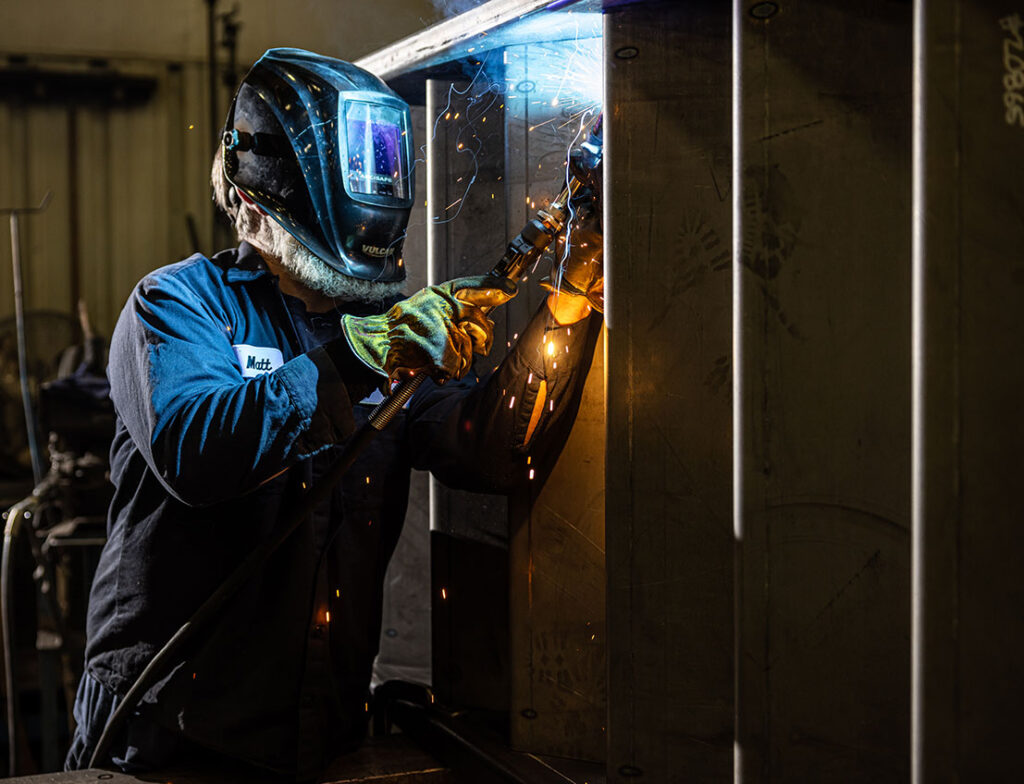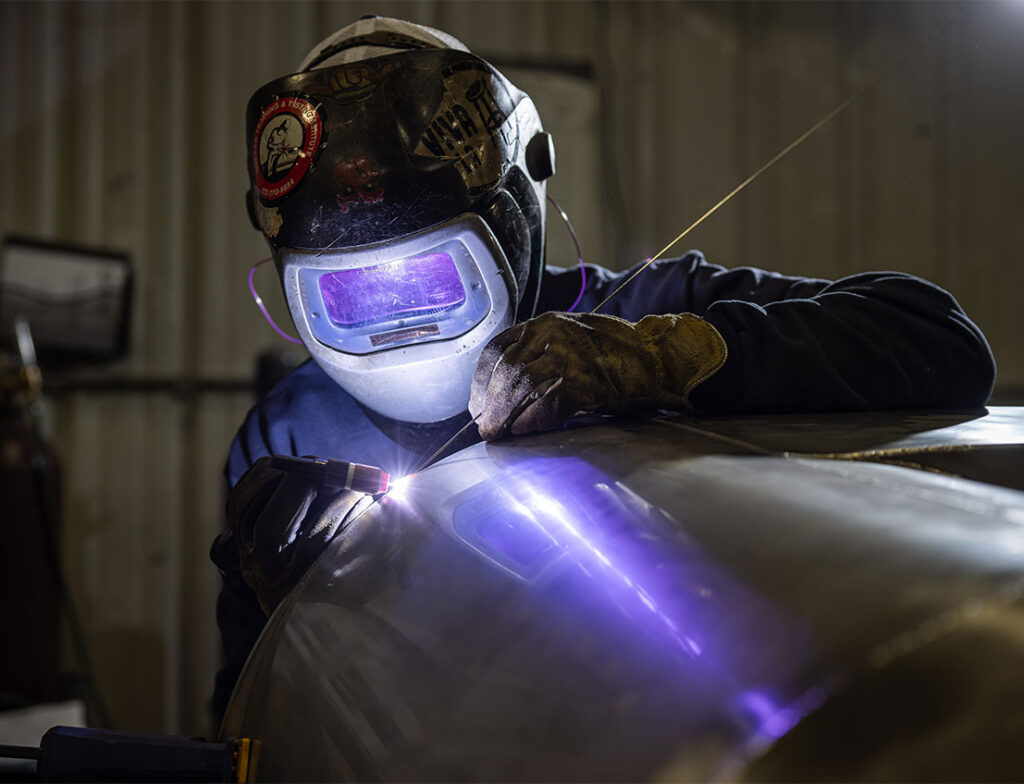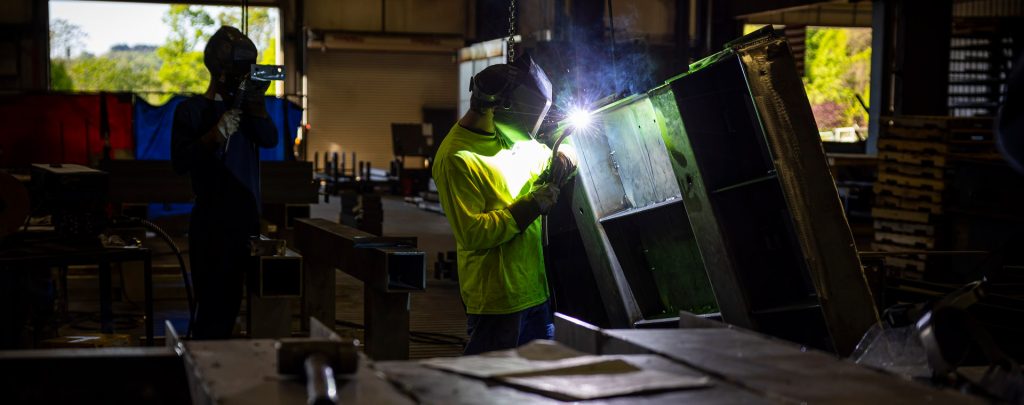
What It’s Like to Be a Welder at SWF Industrial
Posted: October 2025
“If you’ve ever been worried about work or job security, there’s never a shortage in welding.”
— Nate Irwin, Foreman at SWF
Welding is more than sparks and steel. It is a career that offers stability, pride, and the chance to see your work shape the world around you.
 At SWF Industrial, welders don’t just punch in and out. They fabricate impactful products and components that serve a much greater purpose, including wastewater piping that helps provide clean drinking water for communities across the country, stainless steel processing systems that ensure your food is safe to eat, and steel beams and infrastructure that drive the American economy forward.To understand what it’s really like to be a welder in Pennsylvania, we sat down with three team members in different stages of their careers:
At SWF Industrial, welders don’t just punch in and out. They fabricate impactful products and components that serve a much greater purpose, including wastewater piping that helps provide clean drinking water for communities across the country, stainless steel processing systems that ensure your food is safe to eat, and steel beams and infrastructure that drive the American economy forward.To understand what it’s really like to be a welder in Pennsylvania, we sat down with three team members in different stages of their careers:
- Griffin Lehr, a young graduate blending welding with design and laser cutting.
- Ryan Hess, a thirty-year veteran whose career has come full circle into quality assurance.
- Nate Irwin, a foreman who worked his way from fire watch at fifteen to leading crews across the country.
Just like other new faces at SWF, including Jacob Smith, Anthony Laterza, and Tommy Phipps, their stories show how people can find a home here, at any stage of their career.
Three Journeys Into Welding and Why It Might Be the Path for You
Griffin: From Hotrods to High-Tech
Griffin’s love of welding began the way it does for many hands-on learners: working on hotrods with his dad. “It wasn’t just about fixing cars,” he explained. “It was about figuring out how things fit together, and welding was the skill that made all of that possible.”
He carried that curiosity through a four-year trade school program where he studied welding in depth. But once he graduated, he realized welding could take him beyond the shop floor.
“At SWF, I’m not only welding,” he said. “I’m also doing brake press work, drawings, and designs for laser cutters. Welding opened the door for me to follow a lot of different interests.”
Griffin represents the new generation of welders in PA. For him, the appeal is variety: the chance to combine technical training with creativity, design, and problem-solving.
Ryan: A Lifelong Builder
Ryan Hess started welding in his senior year at Mount Joy CTC. “I picked up the torch and never put it down,” he said. Thirty years later, he has welded everything from structural steel to fire trucks. He remembers the pride of knowing his welds weren’t just strong, they were lifesaving.
“Some of the fire trucks I worked on, my welds were keeping the vehicle safe in emergencies,” Ryan explained. “That’s when it hit me. Welding isn’t just a trade. It’s a way of driving the economy and building the country.”
At SWF, Ryan has worked on projects ranging from foundries to sanitary piping systems in food and beverage facilities. “It amazes me that one project might be touched by twenty people,” he said. “From the project manager who orders the steel, to the person who preps it, to the fabricator who welds it, to the crew who installs it. It’s a chain of trust, and you’re part of it.”
Now in a Quality Assurance role, Ryan draws from decades of experience to ensure projects meet SWF’s standards. “With thirty years behind me, I know what a good weld looks like. I know how to check my work, and I know how to guide others. It’s not about being perfect. It’s about finding your mistakes and fixing them.”
Nate: A Welder’s Evolution
For Nate Irwin, welding was less a choice and more a calling. “I was fifteen, working as a fire watch in my family’s company. My job was literally to stand there and make sure nothing caught fire while the welders worked. But I was watching them, and I picked up a lot just by seeing it done.”
By the time he was in high school, Nate was studying ag mechanics and had already tried his hand at process piping. “I learned by practice. I welded during breaks, after hours, anytime I could. I wasn’t good at first, but that’s how you get better.”
Nate’s career took him around the country, from food and beverage plants to pharmaceutical facilities. He became an expert in high-purity stainless steel TIG welding, a specialty that requires precision and patience.
“The average age of a welder when I started was fifty-five,” he said. “A lot of those older guys are gone now. I was lucky to learn from them while I could. Now I try to pass that on.”
At SWF, Nate is a foreman, but he still sees himself as a welder at heart. “There’s a difference between a welder and a fabricator,” he explained. “A welder puts two pieces of metal together. A fabricator takes a concept, reads the blueprint, plans the layout, and uses welding as one part of building the finished product. That’s the level we’re working at here.”

How to Become a Welder in Central PA
Griffin, Ryan, and Nate’s stories show a few of the many ways to become a welder.
Some paths are through school, others through direct experience.
- Griffin went to a four-year trade school.
- Ryan learned through a vo-tech program in high school.
- Nate was self-taught in the field before working his way up.
“You don’t need a four-year degree to start welding,” Ryan said. “But you do need to be willing to learn, to pay attention, and to care about your work.”
Recommended Training Options
Central PA has strong vocational and trade school programs that prepare students for careers in welding. Pairing classroom learning with hands-on practice is the best foundation.
For those who wonder, “Do I need college to become a welder?”, the answer is no. Trade schools, welding classes, and apprenticeship programs are the proven path.
Certifications and Skills That Open Doors
Certifications are part of a welding career, but they are not the whole story.
“Welding certifications matter, but not as much as having pride in your work,” Nate explained. “The proof’s in the pudding. Can you make a weld that holds? Does it look clean? Can you read a blueprint and see how it all comes together?”
Ryan added, “Early in my career, I looked at the five best welders in the shop and copied them. I wasn’t perfect, but I kept checking my work and fixing my mistakes. That’s how you grow.”
At SWF, skills like reading blueprints, fabrication, and communication are just as important as passing a certification test.
What It’s Like to Work at SWF as a Welder or Fabricator

A typical day at SWF starts with understanding the project. Welders and fabricators consider how the pieces fit together, what processes they’ll need, and how the work will transition from the shop to the field.
Ryan described it this way: “When I drive in, I’m already planning my day in my head. If it’s a big weldment, I think about where to start, whether I need to preheat thicker steel, and how to break it down into smaller steps. A lot of prep goes into doing it right.”
Nate sees his role as bigger than welding. “It’s not about the bead of weld. It’s about the whole process: layout, communication, planning, and perfection. Welding is just the tool that gets you there.”
Not Just Welders, Fabricators Who Problem-Solve
Nate compares it to writing. “There’s a difference between a typist and a writer. Both can put words on paper, but one creates something meaningful. In welding, a fabricator creates. They take the idea and bring it to life.”
Teamwork and Career Mobility
Every project at SWF involves a team. “It takes dozens of people,” Ryan said. “From the project manager ordering steel, to the fabricator in the shop, to the installer in the field. Everyone plays a part.”
Teamwork leads to growth. Griffin is developing design skills. Ryan moved into QA. Nate advanced to foreman. All three started as welders, proving that the path at SWF is not fixed—it evolves with you.
Teamwork also means looking out for each other. Whether it’s double-checking a weld, adjusting a layout, or making sure conditions are safe before the job starts, the crew knows that quality and safety go hand in hand. At SWF, safety isn’t just a buzzword, it’s a way of life.
What Makes a Great Welder (and Teammate) at SWF
When asked what qualities make someone successful, all three agreed:
- Be detail-oriented
- Be humble and willing to learn
- Take pride in the work you do
- Show up for your teammates
- Always look for ways to improve
“If you don’t care about the work, you won’t produce a product people can trust,” Nate said. “Caring is the difference.”
Growth, Mentorship, and Career Opportunities at SWF
SWF welders don’t stay in one lane. The company encourages internal growth, and promotions often come from within.
- Griffin sees paths to becoming a project manager or foreman.
- Ryan modeled himself after the shop’s best and now mentors others.
- Nate went from fire watch to foreman because he always asked to learn more.
Career advancement is backed by clear policies and support, as outlined in SWF’s employment practices.
“Welders are great,” Nate said. “But the sky’s the limit. At SWF, you can grow into whatever role fits your strengths.”
Advice for Students and Job Seekers Considering Welding
- Griffin: “Go to school, pay attention, and take every opportunity. You won’t be amazing at all of it, but you’ll find your strengths.”
- Ryan: “Learn as much as you can and don’t be afraid to try something new. We’re building America here.”
- Nate: “Be teachable. Have pride in what you do. The reward is seeing something go from concept to completion. That purpose is huge.”
Their advice has one thing in common: welding is about more than skill. It is about attitude, curiosity, and the willingness to grow.
Conclusion: A Welder’s Pride, a Nation’s Backbone
At SWF, welding is not just a trade; it’s a passion. It is a craft, a career, and a way to make a lasting impact. From young welders just starting out to veterans with decades of experience, SWF offers a place to learn, grow, and take pride in your work.
For those ready to start their journey or take the next step, SWF offers more than a job. It is a place to learn from experienced welders, grow into new roles, and take pride in building projects that matter.